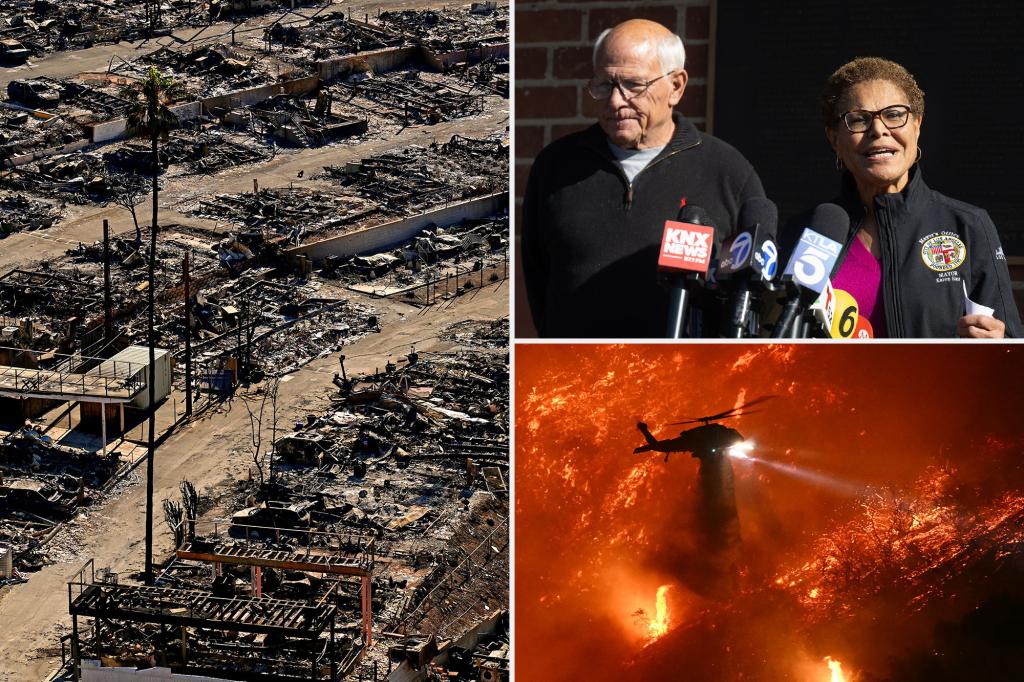World
Los Angeles wildfire czar’s $500K paycheck for 90 days of work draws swift blowback, mayor reverses course

Los Angeles Mayor Karen Bass Reverses Decision on Wildfire Recovery Czar’s Compensation
A Swift Change in Plans: Mayor Bass Reconsiders Payment for Recovery Efforts
In a surprising turn of events, Los Angeles Mayor Karen Bass has reversed her decision regarding the compensation of Steve Soboroff, who was appointed as the city’s wildfire recovery czar. Initially, Soboroff was set to receive $500,000 for his 90-day role, with the funds coming from charity organizations. However, following public outcry and criticism, Mayor Bass announced that Soboroff would instead manage the city’s rebuilding efforts without any compensation. This decision was made after Bass personally requested Soboroff to modify his agreement, to which he agreed. Additionally, Randy Johnson, another real estate executive who was to be paid $250,000 for assisting Soboroff, will also now work for free. Bass expressed gratitude for Johnson’s expertise and generosity, though the mayor’s office did not disclose the specific charity organizations involved or how the funds were raised.
Public Backlash and Criticism Over High Compensation
The initial compensation plan sparked significant controversy, with many expressing outrage over the sizable payments. Los Angeles City Councilwoman Monica Rodriguez, a member of the five-person recovery committee, described the $750,000 total for both Soboroff and Johnson as “infuriating” and “obscene.” President Donald Trump’s envoy, Ric Grenell, also weighed in, labeling the payments “gross” and “offensive.” Grenell, who attended a roundtable discussion with Trump in Pacific Palisades, pointed out that many others involved in recovery efforts were unpaid, emphasizing the need for accountability in federal funding for California. Similarly, affected residents like Larry Vein and Steve Danton criticized Soboroff’s compensation, with Danton calling it a “money grab” that reflected a broader “crisis of leadership” in the city.
Soboroff Defends His Role and Expertise
Despite the backlash, Steve Soboroff defended the initial compensation plan, arguing that his extensive experience and the scope of his responsibilities justified the $500,000 payment. Soboroff, who has previously served in volunteer roles on the city’s Board of Police Commissioners and the Department of Recreation and Parks, emphasized his specialized expertise and the significant responsibilities he undertook as recovery czar. These included communicating with federal agencies, making recommendations on the city’s permitting process, and advising Mayor Bass to hire an outside project manager to oversee infrastructure replacements. Soboroff noted that while he had worked on civic projects for free in the past, this role required him to set aside other lucrative consulting work. He also stressed that his compensation would not come from city funds or wildfire survivors, ensuring that the money allocated for recovery efforts would go directly to those in need.
The Broader Implications of the Controversy
The controversy over Soboroff’s compensation has raised important questions about transparency, accountability, and the role of philanthropy in public crises. While the involvement of charity organizations to fund recovery efforts is commendable, the lack of clarity regarding the source and allocation of funds has led to skepticism among residents and officials. The situation also highlights the challenges of balancing expertise and compensation in crisis management. On one hand, individuals with specialized knowledge and experience are essential for effective recovery efforts. On the other hand, the perception of financial gain during a time of crisis can undermine public trust and divert attention from the critical work being done.
Moving Forward: A Focus on Recovery and Rebuilding
As the city moves forward with its recovery efforts, the focus must remain on supporting affected communities and ensuring that resources are used efficiently and transparently. Soboroff’s decision to work without pay, alongside Johnson’s similar commitment, demonstrates a recognition of the need to prioritize the public’s trust and the gravity of the situation. While the initial controversy has sparked important conversations, it is crucial that these discussions do not overshadow the progress being made. Soboroff has already taken significant steps, including engaging with thousands of residents, streamlining permitting processes, and facilitating collaboration between city agencies and federal partners. These efforts, if sustained, could pave the way for a more resilient and responsive Los Angeles.
Conclusion: Leadership, Accountability, and Community Expectations
The reversal of Soboroff’s compensation and the broader debate it sparked underscore the delicate balance between leadership, accountability, and community expectations. In times of crisis, public trust is paramount, and even the perception of impropriety can have lasting consequences. While Soboroff’s expertise and dedication are undeniably valuable, the decision to forgo payment reflects a necessary commitment to transparency and accountability. As Los Angeles navigates the complexities of recovery, it is essential that city leaders continue to prioritize the needs of affected communities while fostering open communication and collaboration. By doing so, they can build a foundation of trust that will be crucial in the months and years ahead.











